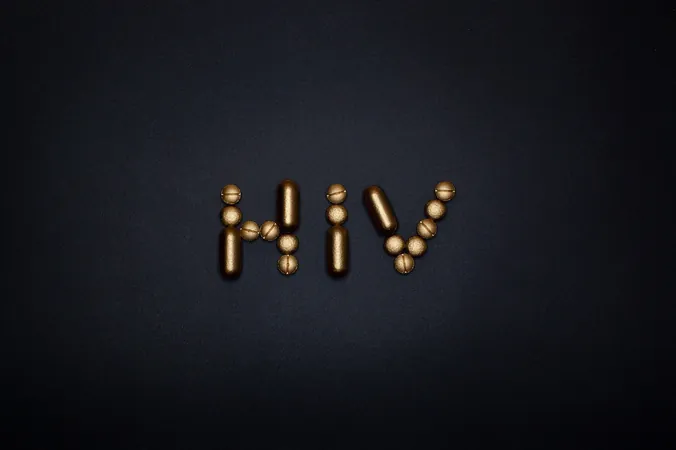
Africa's Urgent Call: Time to Take Charge of the HIV Crisis
2024-10-09
Author: John Tan
Introduction
The intensity of the HIV crisis in Africa is fading into the shadows as it struggles for attention amidst a plethora of global issues, leading to alarming setbacks in the fight against the epidemic. As we mark 23 years since HIV was addressed at the United Nations General Assembly (UNGA), experts in Sub-Saharan Africa are sounding the alarm on the continued impact of the HIV epidemic, which still affects millions, recording new infections and deaths annually.
Progress Made
While global benchmarks set a pathway to follow, it’s crucial not to lose sight of the individual lives and stories woven into the fabric of the HIV epidemic. Since its first Special Session on AIDS in 2001, where global commitment surged, Africa has made commendable advancements: access to life-saving antiretroviral therapy has broadened, AIDS-related fatalities have decreased, and annual HIV infections have sharply declined—59% in eastern and southern Africa and 46% in western and central Africa from 2010 to 2023.
Current State of HIV in Africa
Encouragingly, five African nations have achieved the UNAIDS 95-95-95 targets, with eight more on the verge of reaching this milestone. However, despite this progress, HIV/AIDS remains a significant public health threat, predominantly burdening Africa, which is home to 65% of all individuals living with HIV.
The Need for African Self-Reliance
The pressing issue at hand is whether Africa can pivot from dependency on external support to proving itself self-reliant in the face of global challenges. For true health security and sovereignty on the continent, there is a need for immediate action and strategic collaboration with global partners to transform this ambition into reality.
Treatment Gaps
At the end of 2023, approximately 9.3 million individuals living with HIV still lack treatment, with Sub-Saharan Africa encompassing nearly half of this population, including 86% of all children living with HIV globally. Contrary to the scale of the epidemic, African voices play a minimal role in shaping the international HIV response, as funding and resources have gradually been outsourced to international partners over the past three decades.
Funding Challenges
With the 2025 UNAIDS targets on the horizon, Africa finds itself at a crossroads. The ongoing reliance on external funding poses a severe risk to the sustainability of the progress achieved thus far. Available funding for HIV programs in Western and Central Africa was found to be 16% below the necessary threshold in 2023. The trend is somewhat brighter in Eastern and Southern Africa, where funding remains on track, yet the majority comes from only a few nations like Botswana, Kenya, and South Africa.
Mobilizing Domestic Resources
In order to preserve the hard-fought gains in HIV response, there is a dire need to amplify domestic resource mobilization efforts. The continent requires a robust Africa-led HIV initiative—one that aligns with local priorities and cultural contexts.
Innovative Financing Solutions
Chronic underinvestment from African nations poses significant challenges while rising debt distress complicates advocacy for prioritizing HIV in national budgets. To secure funding, innovative financing solutions such as strategic taxes, diaspora bonds, and co-financing initiatives must be explored. Furthermore, the development of an African-managed regional fund could serve as a crucial step toward financial self-sufficiency and resilience.
Advancements in HIV Research
Moreover, it's not just funding that Africa needs but also advancements in HIV research and innovation. Despite substantial developments in HIV medical technologies worldwide, cost and accessibility remain significant barriers on the continent, where approximately 95% of medicines and 99% of vaccines are imported. This disconnect has resulted in treatments that often lack cultural relevance to the communities they aim to serve.
African Involvement in Research
AFRICANS must be actively involved as equal partners in directing HIV research, ensuring that the priorities align with local needs. Currently, while Africa generates vital data for HIV research, the positions of principal investigators often remain occupied by external actors. Enabling African researchers to spearhead initiatives will help bridge the gap between healthcare needs and available solutions.
Local Manufacturing and Intellectual Property
To achieve this, we must bolster local manufacturing and reevaluate intellectual property regulations to prioritize equity and access. An ecosystem in which African researchers thrive, supported by regional collaborations and equitable partnerships, is crucial. Moreover, ensuring African sovereignty over health data is paramount to align research outcomes with the continent's needs.
Conclusion
As the global community reflects on the recent UNGA discussions, it is essential to celebrate our successes in solidarity while recognizing the persistent disparities in global health governance. We cannot allow statistics to overshadow the lived experiences of those most affected by HIV. Now more than ever, Africa must seize the reins, chart a self-determined course, and lead the charge against the HIV epidemic, ensuring a healthier future for its people. The time for action is now!

 Brasil (PT)
Brasil (PT)
 Canada (EN)
Canada (EN)
 Chile (ES)
Chile (ES)
 España (ES)
España (ES)
 France (FR)
France (FR)
 Hong Kong (EN)
Hong Kong (EN)
 Italia (IT)
Italia (IT)
 日本 (JA)
日本 (JA)
 Magyarország (HU)
Magyarország (HU)
 Norge (NO)
Norge (NO)
 Polska (PL)
Polska (PL)
 Schweiz (DE)
Schweiz (DE)
 Singapore (EN)
Singapore (EN)
 Sverige (SV)
Sverige (SV)
 Suomi (FI)
Suomi (FI)
 Türkiye (TR)
Türkiye (TR)